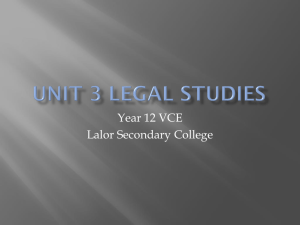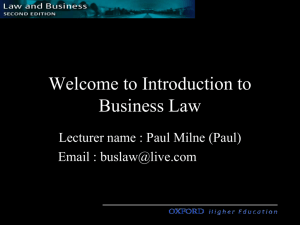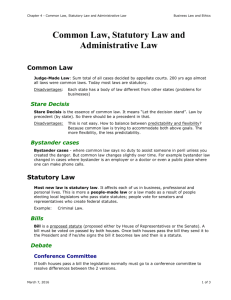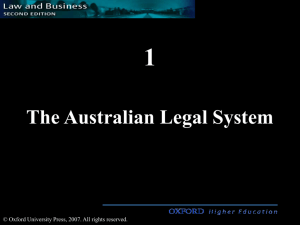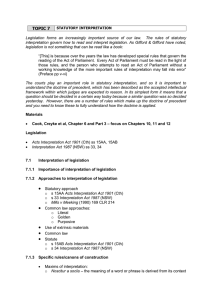4B Admin Statutory interpretation_LawCorners
advertisement
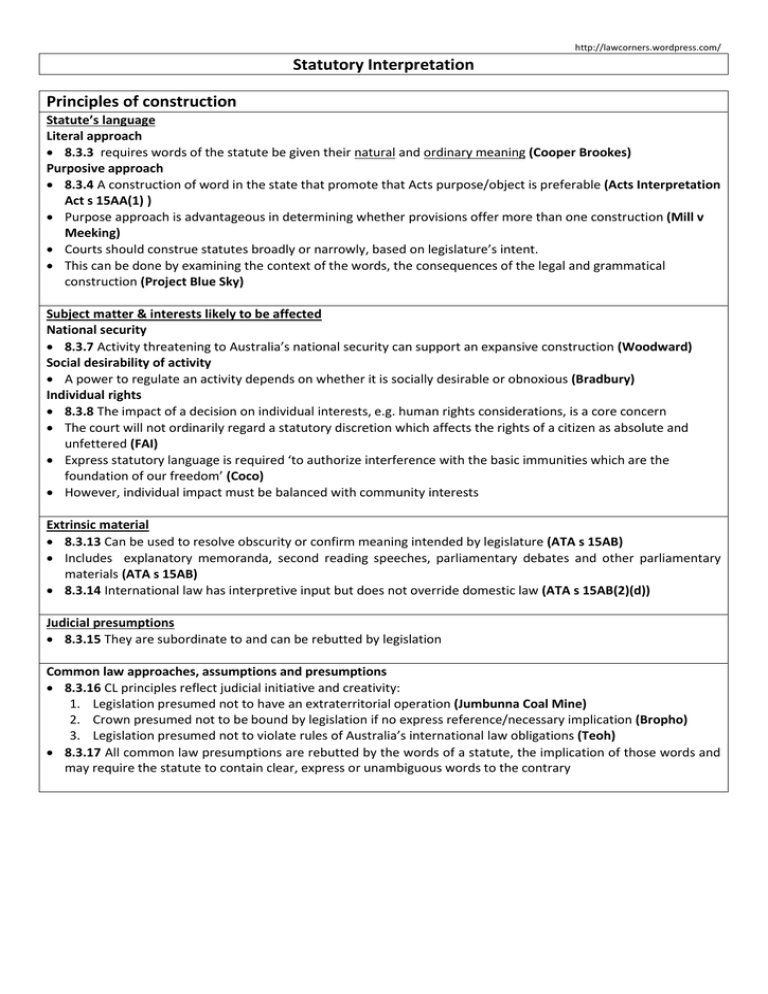
http://lawcorners.wordpress.com/ Statutory Interpretation Principles of construction Statute’s language Literal approach 8.3.3 requires words of the statute be given their natural and ordinary meaning (Cooper Brookes) Purposive approach 8.3.4 A construction of word in the state that promote that Acts purpose/object is preferable (Acts Interpretation Act s 15AA(1) ) Purpose approach is advantageous in determining whether provisions offer more than one construction (Mill v Meeking) Courts should construe statutes broadly or narrowly, based on legislature’s intent. This can be done by examining the context of the words, the consequences of the legal and grammatical construction (Project Blue Sky) Subject matter & interests likely to be affected National security 8.3.7 Activity threatening to Australia’s national security can support an expansive construction (Woodward) Social desirability of activity A power to regulate an activity depends on whether it is socially desirable or obnoxious (Bradbury) Individual rights 8.3.8 The impact of a decision on individual interests, e.g. human rights considerations, is a core concern The court will not ordinarily regard a statutory discretion which affects the rights of a citizen as absolute and unfettered (FAI) Express statutory language is required ‘to authorize interference with the basic immunities which are the foundation of our freedom’ (Coco) However, individual impact must be balanced with community interests Extrinsic material 8.3.13 Can be used to resolve obscurity or confirm meaning intended by legislature (ATA s 15AB) Includes explanatory memoranda, second reading speeches, parliamentary debates and other parliamentary materials (ATA s 15AB) 8.3.14 International law has interpretive input but does not override domestic law (ATA s 15AB(2)(d)) Judicial presumptions 8.3.15 They are subordinate to and can be rebutted by legislation Common law approaches, assumptions and presumptions 8.3.16 CL principles reflect judicial initiative and creativity: 1. Legislation presumed not to have an extraterritorial operation (Jumbunna Coal Mine) 2. Crown presumed not to be bound by legislation if no express reference/necessary implication (Bropho) 3. Legislation presumed not to violate rules of Australia’s international law obligations (Teoh) 8.3.17 All common law presumptions are rebutted by the words of a statute, the implication of those words and may require the statute to contain clear, express or unambiguous words to the contrary http://lawcorners.wordpress.com/ Implied incidental power 8.3.18 Statutes often contain a stated or implied provision that gives an authority the power to undertake any activity that is consequential upon the functions or powers conferred on the agency by the statute (AG v Great Eastern Railway) 8.3.19 An officer responsible for the administration of a statute is will have a general authority and capacity to administer the statute (Herscu) Similar provisions in Acts Interpretation legislation Acts Interpretation Legislation 8.3.22 Limited by other principles of statutory construction: 1. Clear and unambiguous language is required to authorise a public official’s activity that would be otherwise tortious or interferes with rights (Coco) 2. Statutory power must not be used for an unauthorized purpose 3. Activity that is ancillary in nature must complement, not supplement, the statutory scheme (Shanahan) statute only authorises acts/matters which it EXPRESSLY nominates and those acts/matters which are necessarily incidental to the acts so expressly authorized. (Kent v Johnson) Herscu v The Queen Facts: apt convicted of bribing QLD Minister for Local Government ‘in the discharge of the duties of his office’ → Apt argued that the bribe was given for an activity that was not an explicit duty of his office AIA 1901 Cth s 33(3) power conferred by statute to make, grant or issue an instrument, presumptively includes a like power to repeal, rescind, revoke, amend or vary any such instrument Kent v Johnson Residents opposed construction of Telecom tower on Black Mountain (ACT). Postmaster General was to erect the tower, relying on the authority conferred by the Act and 2 other statutes to provide facilities for postal, telegraphic, telephonic services etc. Freedoms and immunity 8.3.24 Legislation is presumed not to abrogate a fundamental right, freedom or immunity other than by express or unambiguous language (Coco) Legislation is presumed not to alter the common law by curtailing a fundamental right, express statutory authority is required to abrogate such rights (Evans v NSW) General words will rarely be sufficient for that purpose (Ptf S157/2002) Coco Evidence about ptf’s bribery this was gathered by disguised cops who installed secret listening devices that were installed in Mr C’s premises. Evidence was inadmissible under Invasion of Privacy Act. Evans v NSW Est of WDY Act 2006 (NSW) gave governor the right to make regulations to regulate behaviour that ‘causes annoyance or inconvenience to participants in a World Youth Day event.’ Applicants thought it’d limit their abilities to freely protest. Plaintiff S157/2002 v Commonwealth Re ptf’s application for a protection visa.Minister is able to grant visa based on applicant satisfying a number of criteria. Minister can refuse, or delegate function to someone use to process application. Ptf claimed he satisfied the refugee convention def of refugee. SECT 15AB Use of extrinsic material in the interpretation of an Act Acts Interpretation Act 1901 (NSW) (1) Subject to subsection (3), in the interpretation of a provision of an Act, if any material not forming part of the Act is capable of assisting in the ascertainment of the meaning of the provision, consideration may be given to that material: (a) to confirm that the meaning of the provision is the ordinary meaning conveyed by the text of the provision taking into account its context in the Act and the purpose or object underlying the Act; or (b) to determine the meaning of the provision when: (i) the provision is ambiguous or obscure; or (ii) the ordinary meaning conveyed by the text of the provision taking into account its context in the Act and the purpose or object underlying the Act leads to a result that is manifestly absurd or is unreasonable. (2) Without limiting the generality of subsection (1), the material that may be considered in accordance with that subsection in the interpretation of a provision of an Act includes: (a) all matters not forming part of the Act that are set out in the document containing the text of the Act as printed by the Government Printer; (b) any relevant report of a Royal Commission, Law Reform Commission, committee of inquiry or other similar body that was laid before either House of the Parliament before the time when the provision was enacted; (c) any relevant report of a committee of the Parliament or of either House of the Parliament that was made to the Parliament or that House of the Parliament before the time when the provision was enacted; (d) any treaty or other international agreement that is referred to in the Act; (e) any explanatory memorandum relating to the Bill containing the provision, or any other relevant document, that was laid before, or furnished to the members of, either House of the Parliament by a Minister before the time when the provision was enacted; (f) the speech made to a House of the Parliament by a Minister on the occasion of the moving by that Minister of a motion that the Bill containing the provision be read a second time in that House; (g) any document (whether or not a document to which a preceding paragraph applies) that is declared by the Act to be a relevant document for the purposes of this section; and (h) any relevant material in the Journals of the Senate, in the Votes and Proceedings of the House of Representatives or in any official record of debates in the Parliament or either House of the Parliament. (3) In determining whether consideration should be given to any material in accordance with subsection (1), or in considering the weight to be given to any such material, regard shall be had, in addition to any other relevant matters, to: (a) the desirability of persons being able to rely on the ordinary meaning conveyed by the text of the provision taking into account its context in the Act and the purpose or object underlying the Act; and http://lawcorners.wordpress.com/ (b) the need to avoid prolonging legal or other proceedings without compensating advantage.
